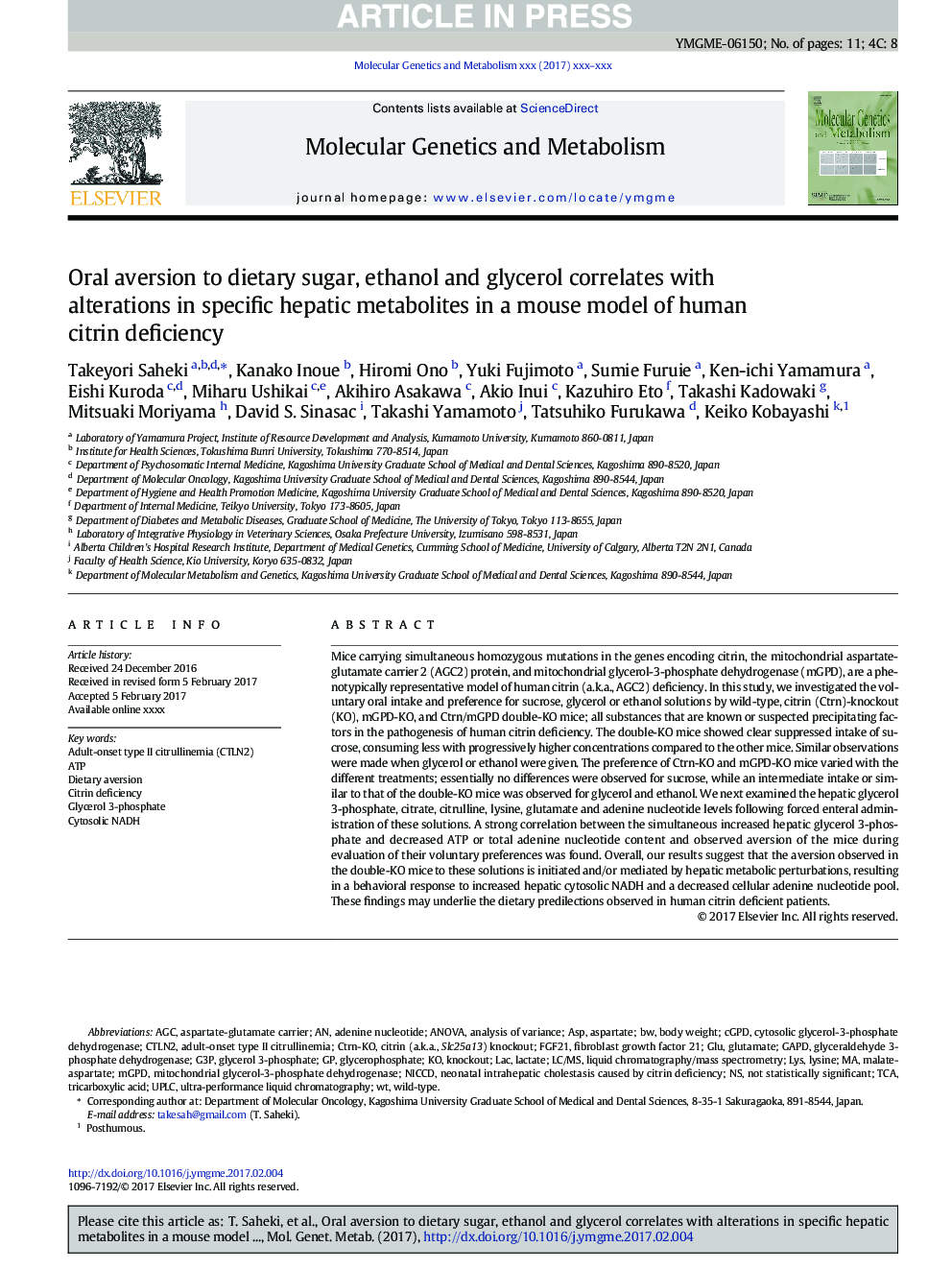| کد مقاله | کد نشریه | سال انتشار | مقاله انگلیسی | نسخه تمام متن |
|---|---|---|---|---|
| 5513942 | 1541555 | 2017 | 11 صفحه PDF | دانلود رایگان |
عنوان انگلیسی مقاله ISI
Oral aversion to dietary sugar, ethanol and glycerol correlates with alterations in specific hepatic metabolites in a mouse model of human citrin deficiency
ترجمه فارسی عنوان
انسداد دهانی به قند، اتانول و گلیسرول در رژیم غذایی با تغییراتی در متابولیت های کبدی خاص در مدل موش کمبود ذرات کمیته انسانی
دانلود مقاله + سفارش ترجمه
دانلود مقاله ISI انگلیسی
رایگان برای ایرانیان
کلمات کلیدی
adult-onset type II citrullinemiaAGCCTLN2UPLCNICCDNeonatal intrahepatic cholestasis caused by citrin deficiencyGAPDMGpdG3PFGF21TCAASPLACcitrin deficiencyLC/MS - LC / MSATP - آدنوزین تری فسفات یا ATPAdenine nucleotide - آدنین نوکلئوتیدaspartate - آسپارتاتnot statistically significant - از لحاظ آماری معنی دار نیستtricarboxylic acid - اسید تری کربوکسیلیکanalysis of variance - تحلیل واریانسANOVA - تحلیل واریانس Analysis of variancefibroblast growth factor 21 - فاکتور رشد فیبروبلاست 21Lactate - لاکتاتLysine - لیزینLYS - لیستknockout - ناکاوتwild-type - نوع وحشیbody weight - وزن بدنLiquid chromatography/mass spectrometry - کروماتوگرافی مایع / طیف سنج جرمیUltra-performance liquid chromatography - کروماتوگرافی مایع فوق العاده عملکردیGlu - گلوglutamate - گلوتاماتGlycerophosphate - گلیسروفسفاتglycerol 3-phosphate - گلیسرول 3-فسفاتmitochondrial glycerol-3-phosphate dehydrogenase - گلیسرول 3-فسفات دهیدروژناز میتوکندریglyceraldehyde 3-phosphate dehydrogenase - گلیسرولیدید 3-فسفات دهیدروژناز
موضوعات مرتبط
علوم زیستی و بیوفناوری
بیوشیمی، ژنتیک و زیست شناسی مولکولی
زیست شیمی
چکیده انگلیسی
Mice carrying simultaneous homozygous mutations in the genes encoding citrin, the mitochondrial aspartate-glutamate carrier 2 (AGC2) protein, and mitochondrial glycerol-3-phosphate dehydrogenase (mGPD), are a phenotypically representative model of human citrin (a.k.a., AGC2) deficiency. In this study, we investigated the voluntary oral intake and preference for sucrose, glycerol or ethanol solutions by wild-type, citrin (Ctrn)-knockout (KO), mGPD-KO, and Ctrn/mGPD double-KO mice; all substances that are known or suspected precipitating factors in the pathogenesis of human citrin deficiency. The double-KO mice showed clear suppressed intake of sucrose, consuming less with progressively higher concentrations compared to the other mice. Similar observations were made when glycerol or ethanol were given. The preference of Ctrn-KO and mGPD-KO mice varied with the different treatments; essentially no differences were observed for sucrose, while an intermediate intake or similar to that of the double-KO mice was observed for glycerol and ethanol. We next examined the hepatic glycerol 3-phosphate, citrate, citrulline, lysine, glutamate and adenine nucleotide levels following forced enteral administration of these solutions. A strong correlation between the simultaneous increased hepatic glycerol 3-phosphate and decreased ATP or total adenine nucleotide content and observed aversion of the mice during evaluation of their voluntary preferences was found. Overall, our results suggest that the aversion observed in the double-KO mice to these solutions is initiated and/or mediated by hepatic metabolic perturbations, resulting in a behavioral response to increased hepatic cytosolic NADH and a decreased cellular adenine nucleotide pool. These findings may underlie the dietary predilections observed in human citrin deficient patients.
ناشر
Database: Elsevier - ScienceDirect (ساینس دایرکت)
Journal: Molecular Genetics and Metabolism - Volume 120, Issue 4, April 2017, Pages 306-316
Journal: Molecular Genetics and Metabolism - Volume 120, Issue 4, April 2017, Pages 306-316
نویسندگان
Takeyori Saheki, Kanako Inoue, Hiromi Ono, Yuki Fujimoto, Sumie Furuie, Ken-ichi Yamamura, Eishi Kuroda, Miharu Ushikai, Akihiro Asakawa, Akio Inui, Kazuhiro Eto, Takashi Kadowaki, Mitsuaki Moriyama, David S. Sinasac, Takashi Yamamoto,
